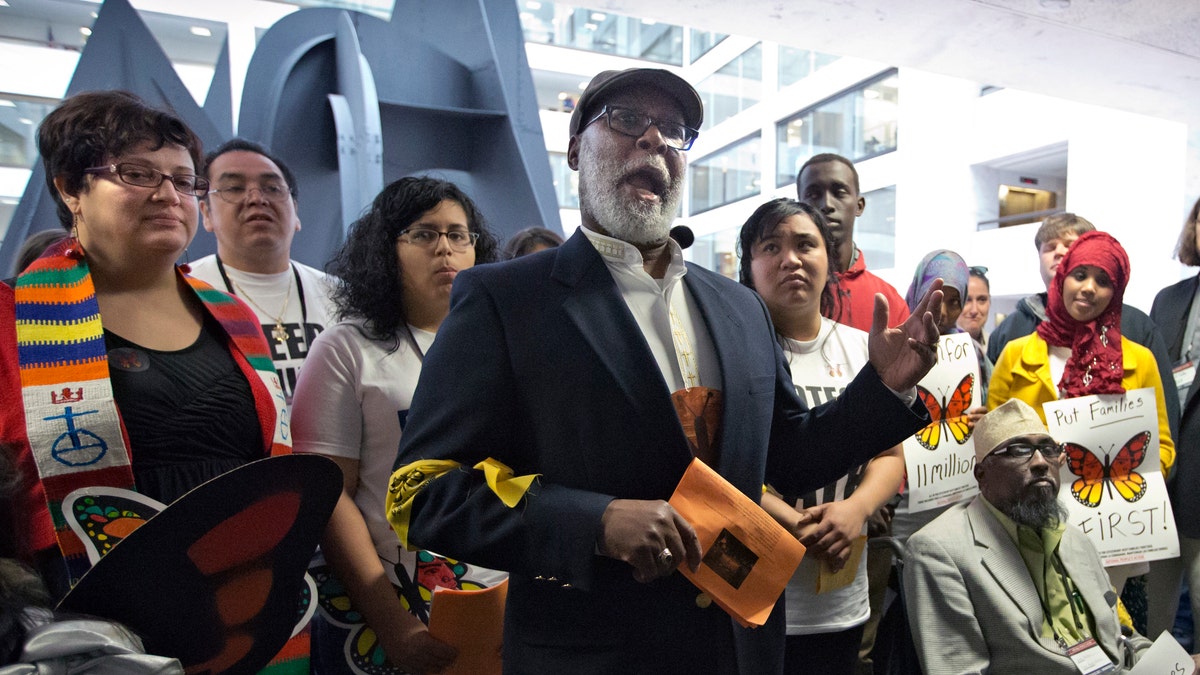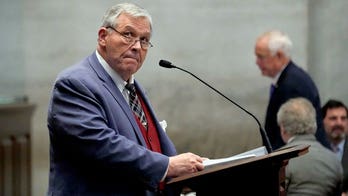
Monday, April 22, 2013: The Rev. Eugene Barnes of Illinois, joins immigration advocates outside the Senate Judiciary Committee hearing on immigration reform on Capitol Hill, in Washington, D.C. (AP)
Lawmakers raised questions Monday about provisions in the proposed immigration overhaul which could create a fast track to legal status for some agriculture workers -- as tempers flared over the separate issue of the Boston bombing and whether it should influence the content of this bill.
Senate Democrats and Republicans, debating the bill at the second hearing held since its introduction, differed over whether illegal immigrants working on U.S. farms should be eligible for a new so-called blue card, which would allow them permanent residence after five years.
Non-farmer workers in the United State illegally would have to wait about twice as long to achieve that status.
Still, the Senate Judiciary Committee debate was again overshadowed and emotionally charged by the Boston Marathon bombings and the legal status of the two Russian-born suspects.
New York Democratic Sen. Chuck Schumer said the tragedy should not be an “excuse” for people to delay passage of immigration reform legislation.
“I never said that,” snapped Iowa Sen. Chuck Grassley, the top Republican on the committee, as he banged his gavel.
On Friday, Grassley said the circumstances related to the tragic bombings underscore the “gaps and loopholes” in the country’s immigration system.
Committee Chairman Sen. Patrick Leahy, D-Vt., began the hearing by saying: “Late last week opponents of comprehensive immigration reform began to exploit the Boston Marathon bombing. … Let no one be so cruel as to try to use the heinous acts of two young men last week to derail the dreams and futures of millions of hardworking people.”
A bipartisan group of eight senators has been working on immigration reform legislation since January, an effort in part by both parties to reach out to Hispanics, the fastest growing part of the U.S. population.
The legislation was officially introduced last week, and five Senate hearings on the overall issue have been held so far this year. Chamber leaders expect to start submitting amendments in May with a vote this summer.
There are an estimated 11 million illegal immigrants in the U.S. And as many as 70 percent of U.S. agricultural workers are in the country illegally.
Roughly 700,000 to 1.1 million illegal agricultural workers would be eligible for the blue card. They first must have at least a two-year work history. And like other applicants, they must pass a criminal background check and pay fines and taxes.
Supporters argue the change is needed in large part because of the high percentage of illegal workers in the industry and Americans won’t do the work.
Alabama Republican Sen. Jeff Sessions argued the guidelines for the proposal were crafted as part of a deal between big business and organized labor that has been present as one “best for the United States.”
He also took issue with the argument about “jobs Americans won’t do.”
“I worry about these kinds of things,” he continued. “It seems the agriculture industry is saying, ‘We’re entitled to … these workers.’ ”
Republican Sens. John Cornyn, Texas, and Lindsey Graham, South Carolina, also raised concerns about how well the overall legislation will improve the tracking of immigrants who overstay their visas.
Cornyn called the existing system essentially “nonfunctional.”
Graham repeated his argument that the 19 hijackers involved in the 9/11 terror attacks were all students who overstayed their visas.




